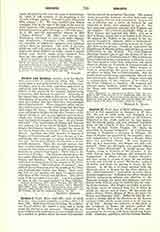

Sergius II, POPE, date of birth unknown; consecrated in 844, apparently in January; d. January 27, 847. He was of noble birth, and belonged to a family which gave two other popes to the Church. Educated in the schola cantorum, he was patronized by several popes, and was ordained Cardinal priest of the Church of Sts. Martin and Sylvester by Paschal. Under Gregory IV, whom he succeeded, he became archpriest. At a preliminary meeting to designate a successor to Gregory, the name of Sergius was accepted by the majority; but a mob endeavored by force to place a deacon, John, upon the pontifical throne. He was, however, shut up in a monastery, and Sergius was duly consecrated. From one obviously very partial edition of the “Liber Pontificalis” it would appear that Sergius, owing to devotion to the pleasures of the table, had no taste for business, and entrusted the management of affairs to his brother Benedict; and that, owing to attacks of gout, he was helpless in body and irritable in mind. His brother usurped all power, and made the getting of money his one concern. As all this is in sharp contrast with the character given to Sergius by the other editions of the “Liber Pontificalis“, there can be no doubt about its gross exaggeration. As Sergius was, of ter a disputed election, consecrated without any reference to the Emperor Lothaire, the latter was indignant, and sent his son Louis with an army to examine into the validity of the election. But Sergius succeeded in pacifying Louis, whom he crowned king, but to whom he would not take an oath of fealty. He also made the king’s adviser, Drogo, Bishop of Metz, his legate for France and Germany (844). Before he died he witnessed a terrible raid of the Saracens on the Roman territory (846), which nearly resulted in the capture of the City. Despite the resistance of the scholce of the foreigners at Rome, the pirates sacked the basilicas of St. Peter and St. Paul, and were only prevented by its strong walls from plundering Rome itself. Churches, aqueducts, and the Lateran Basilica were improved by Sergius, who, on his death, was buried in St. Peter’s.
HORACE K. MANN

